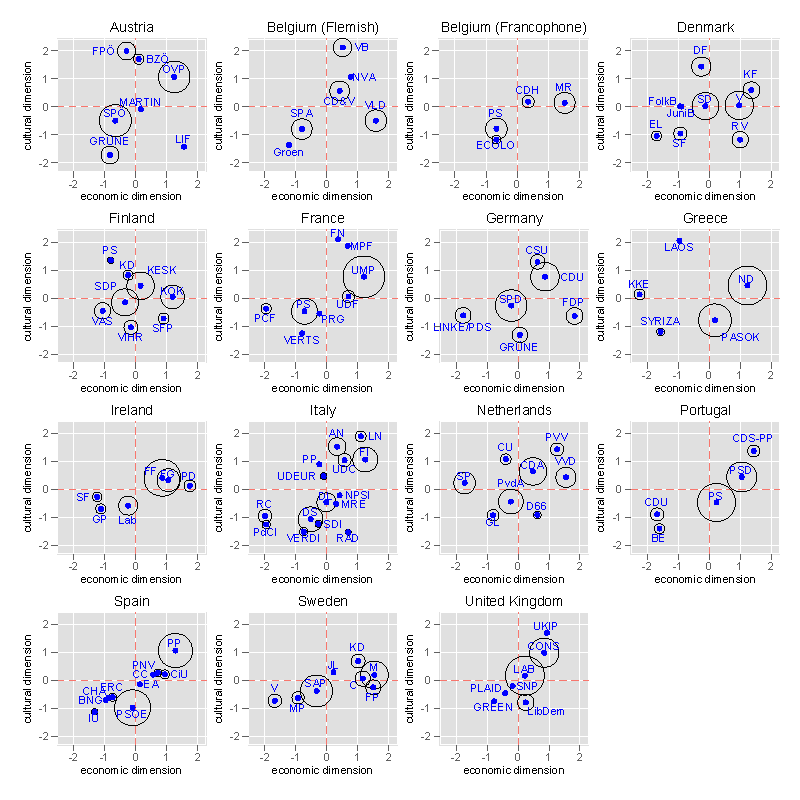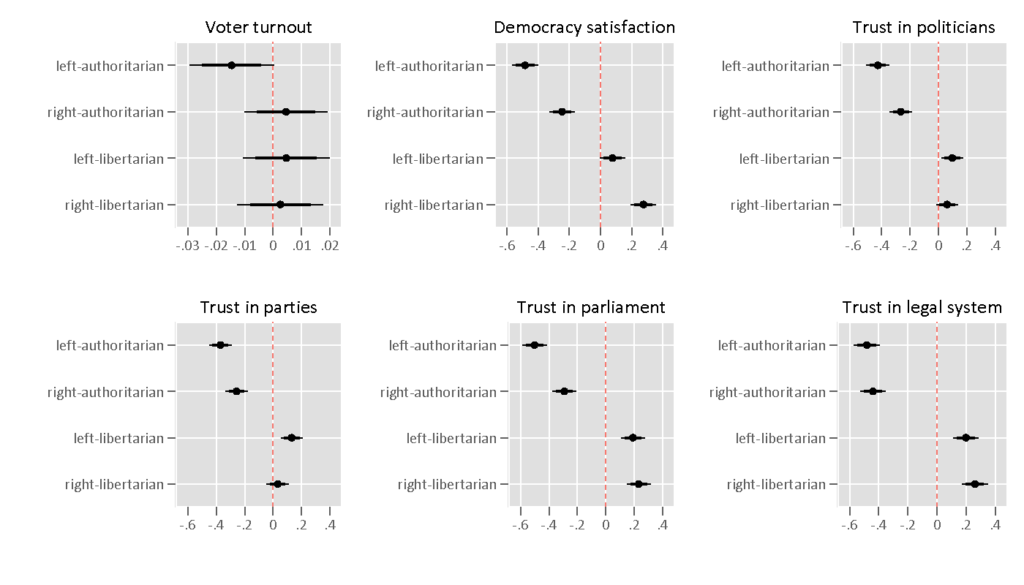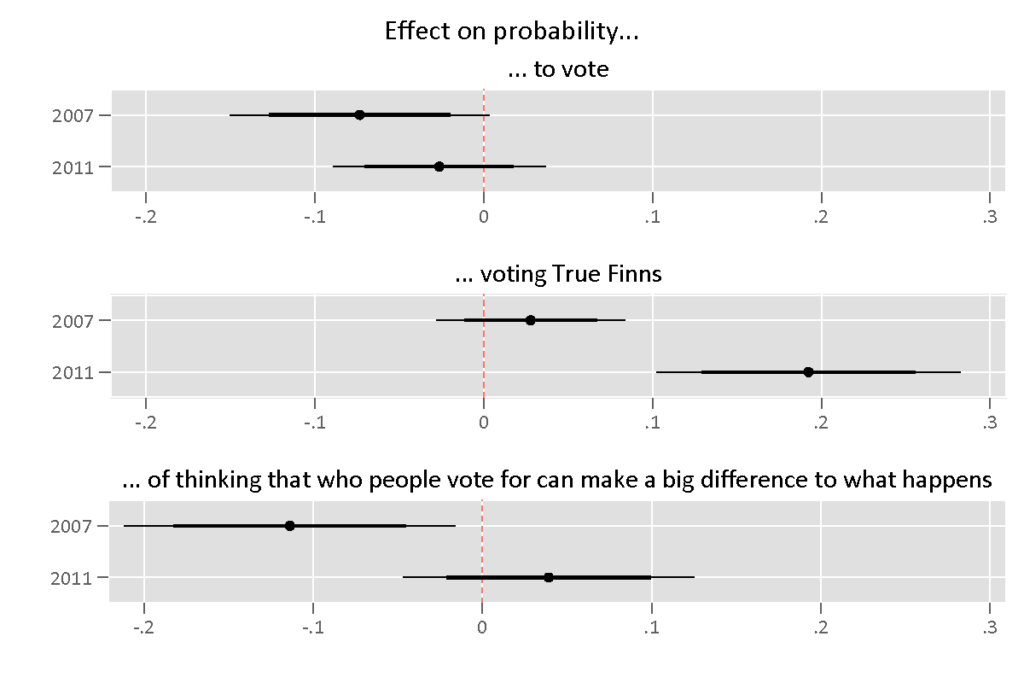Citizens with economically left-wing and culturally right-wing views vote less and are less satisfied with politics
Many citizens hold left-wing positions on economic issues and right-wing positions on cultural issues, but few parties do so. How do these ‘left-authoritarian’ citizens react to the absence of parties that fit their views? Drawing on a new study, Sven Hillen and Nils Steiner report that left-authoritarian citizens are less likely to vote, less satisfied with democracy and have lower levels of trust in political institutions when there is no viable left-authoritarian party.

Photo by Franck V. on Unsplash
Politics is often described in terms of ‘left’ and ‘right’. Yet many citizens do not follow a coherent left-right ideology, but are left-wing on some issues and right-wing on others. When no party matches their mixed set of views on salient political issues, choosing between political parties is tough for such citizens. As a result, they might become frustrated with politics and avoid voting altogether.
In Western Europe and beyond, there are, in particular, many citizens who combine left-wing views on economic issues with right-wing, or ‘authoritarian’, stances on cultural issues. These ‘left-authoritarians’ favour redistribution and market regulation. However, they also value conservative morality, cultural conformity and are critical of immigration. As political scientists studying ‘working-class authoritarianism’ have noted long ago, the combination of such views is particularly common among members of the working class.
The absence of left-authoritarian parties
However, Western Europe’s political parties have rarely taken a left-authoritarian position. We demonstrate this in Figure 1. The figure displays party positions in a two-dimensional policy space composed of an economic and a cultural conflict axis in 14 Western European countries in 2006. We computed these positions from an expert survey among scholars of political parties. The upper-left quadrant represents economically left-wing and culturally authoritarian positions. In the majority of countries (8 out of 14), this left-authoritarian quadrant is completely empty. In addition, those parties that are located in the left-authoritarian quadrant tend to hold few seats in parliament (as indicated by the size of the circles). Moreover, they tend to be moderate on at least one of the two dimensions rather than decisively left-authoritarian.
Figure 1: Positions of political parties in two-dimensional policy space in 2006

Left-authoritarian citizens thus often find themselves in the situation described at the outset: because no political party represents their specific combination of attitudes, they face trade-offs when choosing a party. They have to either privilege their economic or their cultural concerns, while sacrificing the other. Previous research shows that left-authoritarians’ voting decisions depend on which issues are salient to them. Following up on this research, we were interested in the consequences for voter turnout and satisfaction with politics. We suspected that – because of the gap in party supply – left-authoritarians will participate less in elections and be less satisfied with representative democracy and its institutions.
Consequences for voter turnout and political satisfaction
To investigate this, we turned to the pan-European public opinion survey European Social Survey (ESS) from 2008. It includes data from 14 Western European countries. The survey asked about participation in the last national election, satisfaction with democracy and trust in different political institutions. We studied how different positions in the two-dimensional policy space are associated with these outcomes, while controlling for a range of factors shaping voting participation and political satisfaction.
Figure 2 depicts the results of our statistical analysis. The figure shows how being positioned in the four different quadrants of the policy space affects turnout and political satisfaction. To understand the figure, note that the effects have to be interpreted in relation to the group of citizens who are located in the middle of the policy space. Compared to this reference group, left-authoritarian citizens have a lower probability of participating in national elections. The other three groups do not stand out from the reference group. Also in line with our expectation, left-authoritarians are less satisfied with democracy, and they trust politicians, parties and parliaments less than all other groups.
Figure 2: Effects of different attitude combinations on turnout and political satisfaction

Note: The chart shows the effects of being positioned in one of the four quadrants (with 95 and 83 percent confidence intervals, which indicate statistical uncertainty) as compared to individuals who hold a centrist position on at least one dimension. For turnout, the chart shows the (average marginal) effect on the probability to vote. The other estimates indicate the effect on democracy satisfaction and trust as measured on scales from 0 to 10. For more information, see the authors’ accompanying paper in the European Journal of Political Research.
An interesting additional observation is that right-authoritarian citizens (i.e. those with economically and culturally right-wing views) are also more dissatisfied than those in the middle. This could reflect a generally poorer representation of authoritarian positions by competitive parties. Radical right-wing parties, as their harshest advocates, are nowadays represented in many parliaments, but are often isolated and in the opposition. It could also reflect that authoritarian policy attitudes are shaped by authoritarian personality traits and values, which in themselves contribute to a negative assessment of democracy and its institutions. In any event, it remains the case that left-authoritarians are even less satisfied than right-authoritarians. We attribute this difference to the left-authoritarian supply gap. The findings on the legal system in Figure 2 support this interpretation: authoritarians have less confidence in this non-political institution than libertarians, but there is no difference between left- and right-authoritarians in this regard.
The rise of the Finns Party
For additional evidence that lower levels of turnout and political satisfaction among left-authoritarians are indeed contingent on the absence of a successful left-authoritarian party, we carried out a case study of the rise of the Finns Party using data from the Finnish National Election Study. The Finns Party (formerly known as True Finns, see PS for ‘Perussuomalaiset’ in Figure 1) is one of the few parties in Western Europe that holds a decisively left-authoritarian position. We took advantage of the party’s breakthrough in the Finnish parliamentary election in 2011, where it was able to quintuple its vote share compared to the previous election in 2007 (from 4.1% to 19.1%).
We found that the negative association between left-authoritarian positions and turnout as well as political satisfaction diminished to a large extent with the party’s electoral breakthrough. The main results are displayed in Figure 3, where we compare left-authoritarians to individuals with other combinations of issue positions. Regarding turnout, we found a negative effect of the left-authoritarian attitude combination in 2007. In 2011, the effect is no longer statistically distinguishable from zero. Instead of abstaining, left-authoritarians were then more likely to vote for the True Finns. We also looked at individuals’ views on whether voting makes a difference – and obtained even clearer results. While left-authoritarians were more likely to state that voting makes no difference in 2007, this was no longer the case in 2011.
Figure 3: Effects of left-authoritarian attitude combination

Note: The chart shows the effects of being positioned in the left-authoritarian quadrant (with 95 and 83 percent confidence intervals, which indicate statistical uncertainty) as compared to individuals with other combinations of policy attitudes. The effects indicate how being left-wing on economic issues and authoritarian on cultural issues affects the probability of the respective outcomes. For more information, see the authors’ accompanying paper in the European Journal of Political Research.
Broader lessons
Our research shows that citizens with economically left-wing and culturally right-wing views vote less and are less satisfied with politics when no viable party represents their views well on both economic and cultural issues. Parties, in turn, may have incentives to move in the direction of these voters to attract their votes, and they may combine their policy proposals with a populist tone which appeals to the political dissatisfaction among these citizens. Indeed, some of Europe’s radical right parties have adopted left-leaning rhetoric and proposals on economic policy in recent years, arguably in an attempt to better cater to working-class voters who are often right-wing on cultural issues and left-wing on economics.
Going beyond this particular case, our research illuminates a fundamental challenge for representative democracy. When multiple issues are important to voters and when they combine positions on these issues differently than any of the parties, frustration with party supply and politics more broadly may arise. These challenges may well be present in contemporary British politics as well, where it may not be easy for voters to express their preference on Brexit and other issues they care about through a single vote.
This article gives the views of the authors, and not the position of Democratic Audit. It draws on the journal article ‘The consequences of supply gaps in two‐dimensional policy spaces for voter turnout and political support: The case of economically left‐wing and culturally right‐wing citizens in Western Europe’ in the European Journal of Political Research.
About the authors

Sven Hillen is a pre-doctoral researcher at the Department of Political Science, Comparative Politics, at Johannes Gutenberg University Mainz, Germany.

Nils Steiner is a post-doctoral researcher at the Department of Political Science, Comparative Politics, at Johannes Gutenberg University Mainz, Germany.





 Democratic Audit's core funding is provided by the Joseph Rowntree Charitable Trust. Additional funding is provided by the London School of Economics.
Democratic Audit's core funding is provided by the Joseph Rowntree Charitable Trust. Additional funding is provided by the London School of Economics.